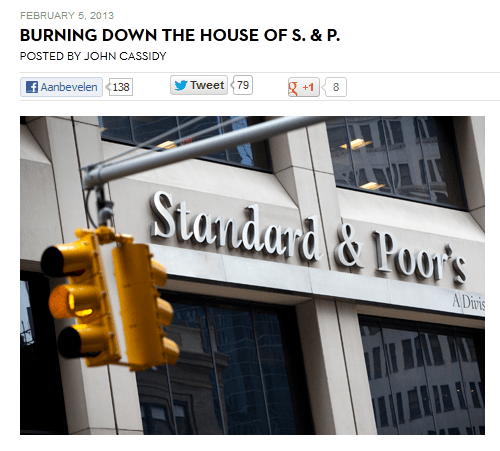

De zaak gaat over de beoordelingen die S&P aan CDO’s en RMBS van verschillende banken gaf. Twee financiële producten zijn dat die hypotheekleningen herverpakten om ze met winst door te verkopen. Sinds de crisis hebben ratingbureaus de kritiek gekregen producten betere ratings te geven dan de producten verdienden. Dat was één van de redenen waarom rommelkredieten verspreid raakten over het mondiale banksysteem.
John Cassidy, journalist en commentator voor The New Yorker:
S. & P. claimed all of its ratings were independent and made in good faith, based on sound reasoning. The government claims otherwise. In particular, it makes two charges. First, between 2004 and 2007, S. & P. deliberately limited, adjusted, and delayed changes to its statistical models and ratings criteria for subprime securities that would have resulted in the firm issuing lower ratings. Second, between March and October of 2007, when it was perfectly clear that the housing bubble had burst, the firm knowingly disregarded the true extent of the credit risks associated with securities it rated.
Een vaak aangehaalde reden voor de onrealistische ratings is dat banken de bureaus moeten betalen om hun producten te beoordelen. Cassidy heeft de cijfers:
The Wall Street firms that put together the securities paid S. & P. hefty fees to rate them: one hundred and fifty thousand dollars for a R.M.B.S., five hundred thousand dollars for a regular C.D.O. based on actual mortgages, and seven hundred and fifty thousand dollars for a fancy (synthetic) C.D.O. based on derivatives tied to the mortgages. It was a big business. Between 2005 and 2007, S. & P.’s C.D.O. division alone generated four hundred and sixty-one million dollars in revenue.
S&P heeft er vertrouwen in de rechtszaak – het gaat om vijf miljard dollar – te kunnen winnen, maar daarvoor moest het bedrijf haar intern mailverkeer vrijgeven. Het beeld dat daaruit spreekt zullen de advocaten van S&P tegenover een jury moeten zien te nuanceren:
Most of the headline-grabbing e-mails and messages come from that period in 2007, when S. & P.’s employees were tussling with data showing an unprecedented deterioration in the subprime-mortgage market, with loan delinquencies rising sharply. The numbers were so bad, the complaint says, that some S. & P. analysts initially thought the data contained typographical errors. But rather than immediately issuing a mass downgrade of lower quality mortgage bonds, which would have had a devastating impact on the C.D.O. ratings as well, S. & P. reacted slowly and cautiously, placing just a few products on a credit watch for a possible downgrade.
En net als bij Morgan Stanley blijkt uit mailverkeer ook het gevoel voor humor van de werknemers. De genaamde ‘Analist D’ schreef een nieuwe tekstversie van ‘Burning Down the House’ van de Talking Heads over de hypotheekmarkten. Niet briljant, maar hij stuurde het naar al zijn collega’s door. “For obvious professional reasons, please do not forward this song. If you are interested, I can sing it in your cube”, kwam erachter.
De overige e-mails die Cassidy vermeldt, illustreren een debat binnen S&P over het aanpassen van de gehanteerde modellen. Er werden striktere voorwaarden voorgesteld, maar die werden uiteindelijk tegengehouden omdat het bureau vreesde klanten te verliezen:
Throughout the summer of 2005, S. & P. beta-tested the new version of the model. Bear Stearns, which was a big player in the subprime C.D.O. market, including the then-fast-growing synthetic C.D.O. market, gave it a particularly negative reaction, prompting S. & P. to slow down its rollout.
In een column in The Financial Times wordt vandaag dieper ingegaan op de reden waarom ratingbureaus in de Verenigde Staten tot nog toe niet werden berecht: door andere rechtbanken werd eerder al beslisten dat de ratings die ze geven onder de vrijheid van meningsuiting vallen:
The argument was that, since the agencies have no contract with, or fiduciary duty to, bond investors, they can publish more or less any opinion without being liable. They might be mistaken; they might be deluded; they might call something triple A steak when it’s subprime horse. Caveat emptor. The hole in this, of course, is that agencies are not just analysing and rating bonds for the sake of self-expression and because they enjoy it. They are being paid to do so by the issuers of bonds. [...] Bond rating is a business and the agencies’ ratings are opinions that carry commercial weight and are cited by central banks. Why should they get a carte blanche whereas if you go and buy a car and the dealer wrongly certifies that it is new, he is liable? Why would there be any difference? says James Cox, a law professor at Duke University.
Het commentaarstuk van Cassidy staat op de site van The New Yorker. De column van John Gapper uit The Financial Times staat hier. Ook The New York Times heeft uitgebreide berichtgeving.




